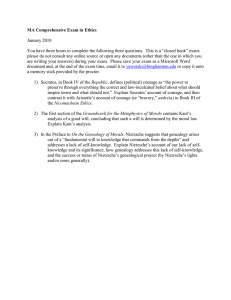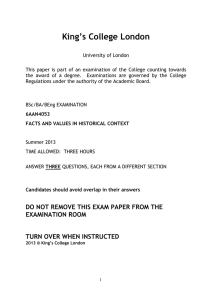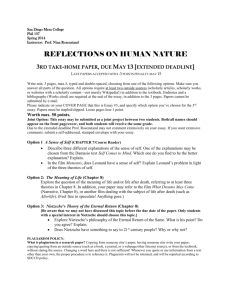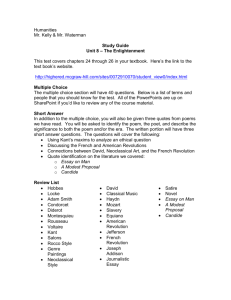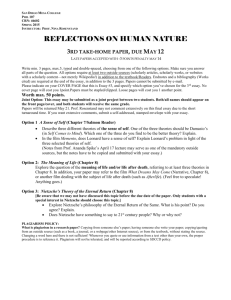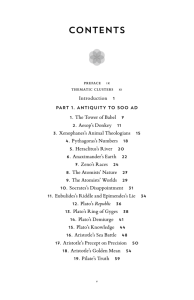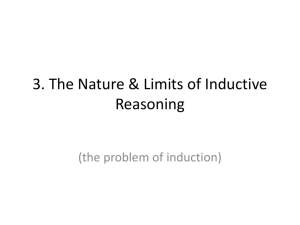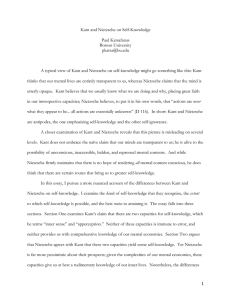Human Being and Citizen
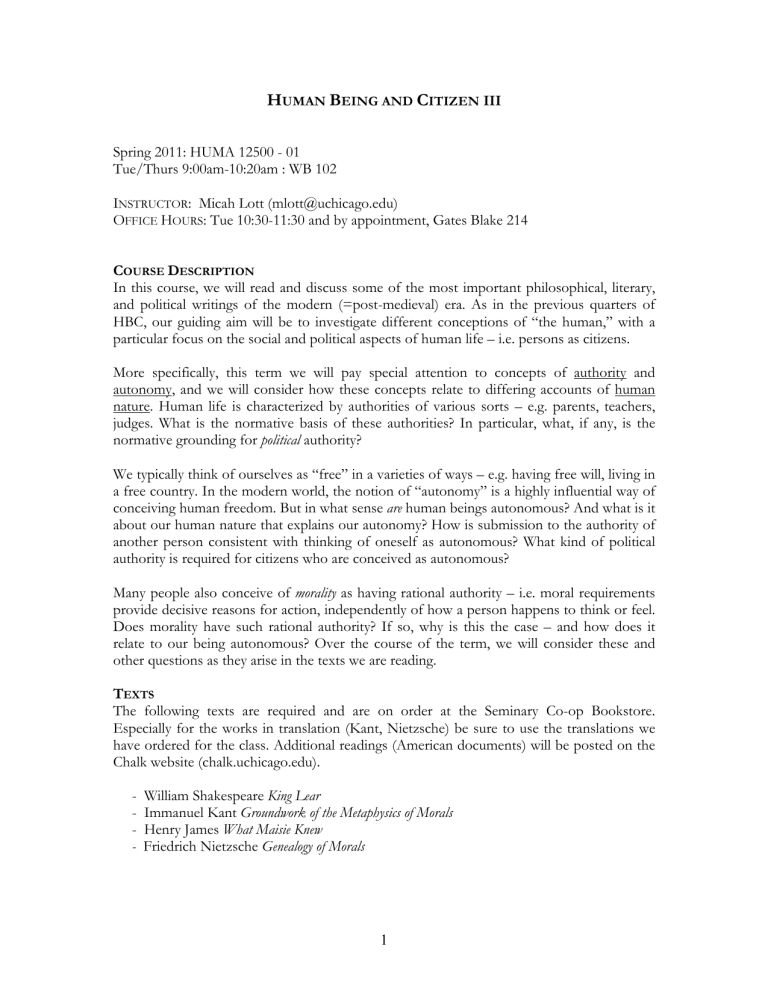
H UMAN B EING AND C ITIZEN III
Spring 2011: HUMA 12500 - 01
Tue/Thurs 9:00am-10:20am : WB 102
I
NSTRUCTOR
: Micah Lott (mlott@uchicago.edu)
O
FFICE
H
OURS
: Tue 10:30-11:30 and by appointment, Gates Blake 214
C
OURSE
D
ESCRIPTION
In this course, we will read and discuss some of the most important philosophical, literary, and political writings of the modern (=post-medieval) era. As in the previous quarters of
HBC, our guiding aim will be to investigate different conceptions of “the human,” with a particular focus on the social and political aspects of human life – i.e. persons as citizens.
More specifically, this term we will pay special attention to concepts of authority and autonomy, and we will consider how these concepts relate to differing accounts of human nature. Human life is characterized by authorities of various sorts – e.g. parents, teachers, judges. What is the normative basis of these authorities? In particular, what, if any, is the normative grounding for political authority?
We typically think of ourselves as “free” in a varieties of ways – e.g. having free will, living in a free country. In the modern world, the notion of “autonomy” is a highly influential way of conceiving human freedom. But in what sense are human beings autonomous? And what is it about our human nature that explains our autonomy? How is submission to the authority of another person consistent with thinking of oneself as autonomous? What kind of political authority is required for citizens who are conceived as autonomous?
Many people also conceive of morality as having rational authority – i.e. moral requirements provide decisive reasons for action, independently of how a person happens to think or feel.
Does morality have such rational authority? If so, why is this the case – and how does it relate to our being autonomous? Over the course of the term, we will consider these and other questions as they arise in the texts we are reading.
T
EXTS
The following texts are required and are on order at the Seminary Co-op Bookstore.
Especially for the works in translation (Kant, Nietzsche) be sure to use the translations we have ordered for the class. Additional readings (American documents) will be posted on the
Chalk website (chalk.uchicago.edu).
- William Shakespeare King Lear
- Immanuel Kant Groundwork of the Metaphysics of Morals
- Henry James What Maisie Knew
- Friedrich Nietzsche Genealogy of Morals
1
C
OURSE
R
EQUIREMENTS
I) P
ARTICIPATION
. This is a discussion-based, seminar-style course. This means that you should attend every class, and it will be clear to all when you are not present. I will take attendance. You are allowed 2 unquestioned absences. After that, each absence will cost you a step in your participation grade (from A to A-, B+ to B). Absences may be excused by extreme circumstances (e.g. sickness with doctor’s note; family tragedy or crisis). An absence will not be excused if you email me to explain that you are very busy, not feeling well, etc.
You should come to class having read and thought about the assigned texts, and prepared to discuss them. You should also be prepared to be called on in class. If you show yourself to be unprepared for class discussion, this will adversely impact your participation grade. You will receive credit for the quality, not the sheer quantity, of your participation.
In addition, at the discretion of the instructor, there may be short writing assignments that will be due in class. These will figure into your participation grade.
Participation—in-class and in your writing seminars—will account for 20% of your final grade. I emphasize: the participation aspect of your grade will not be a “free pass” for full credit. If you are not the sort of student who enjoys coming to every class and participating,
I suggest you consider registering for a different section of HBC.
II) A SSIGNMENTS .
You will write three papers:
First paper (5 pages), due April 28th, worth 25% of your final grade.
Second paper (5 pages), due May 24th, worth 25% of your final grade.
Third paper (6 pages), due June 7th, worth 30% of your final grade.
G
RADING
You will receive both letter and numerical grades for each assignment. The numerical grades will be used to calculate your final grade. Numerical and letter grades correspond as follows:
A 10.0-9.5
B+ 8.9-8.7
C+ 7.9-7.7
A- 9.4-9.0
B 8.6-8.3
C 7.6-7.3
B- 8.2-8.0
C- 7.3 or below
Late papers will be deducted one grade (e.g. from B to B-) for each day after the deadline they are received. You are allowed 1, no questions ask, no penalty, 2-day extension on one of the papers. No other extensions are allowed. I suggest you save this till absolutely necessary.
P LAGIARISM
Plagiarism is strictly forbidden. If you are unsure of what counts as plagiarism, consult the
University’s policy on academic honesty and plagiarism.
E LECTRONICS
All electronic devices should be switched to silent mode before coming to class. Because laptops tend to be a distraction and an impediment to discussion, their use is prohibited.
2
If you have any questions or concerns, including any concerns related to a disability or special need, please feel free to speak with me or email me.
S CHEDULE OF R EADINGS
WEEK 1
3/29 Introduction; King Lear - please read entire play as soon as possible
• Course themes and class room policies; Introducing Lear: What is this play about?
3/31 King Lear - focus on Acts I and II
• Authority and office: rulers and subjects; parents and children. Duty and (vs.?) love.
WEEK 2
4/5 King Lear - focus on Acts II and III
• Humans vs. animals. Human nature, the natural world, and the political community.
Error, madness, deception.
4/7 King Lear - focus on Acts IV and V
• The resolution of the play. The figure of Cordelia: nature (un)redeemed? Wisdom of suffering? A restoration of justice?
WEEK 3
4/12 Kant Groundwork - preface and part I
4/14 Kant Groundwork - part I continued
WEEK 4
4/19 Kant Groundwork - part II (first assignment questions distributed)
4/21 Kant Groundwork - part II continued
WEEK 5
4/26 Kant
4/28 Kant
Groundwork
Groundwork
(first paper due)
- part III
- part III cont; Problems. prospects, contemporary Kantians
WEEK 6
5/3 Declaration of Independence; Federalist 10 & 51
5/5 Declaration of Sentiments; Douglas - 4 th of July Speech;
3
WEEK 7
5/10 Lincoln – two addresses; King - Letter from a Birmingham Jail
5/12 James What Maisie Knew - please read entire novel before our discussion
(second assignment questions distributed)
• Parents and children (again). Maise’s view of the world and James’ narrative strategy.
Genres and their possibilities: novels / plays / speeches / works of philosophy
WEEK 8
5/17 James What Maisie Knew - focus on chapters 22-31
• Varieties of “being free.” Morality, society, tradition and “the moral sense”.
Maise able (and forced) to choose.
5/19 Nietzsche Genealogy of Morals – preface and essay 1
• The purpose and structure of the investigatioin; “Good & Evil” vs. “Good and Bad”
Noble and slave morality; the (re)evaluation of values
WEEK 9
5/24 Nietzsche Genealogy of Morals – essay 1 continued and essay 2
(second assignment due)
• Moral concepts examined: guilt, obligation, duty, punishment
5/26 Nietzsche Genealogy of Morals – essay 2 continued and essay 3
(third assignment questions distributed)
• Further developments in human history: Bad conscience and the instinct for freedom; the state, the law, God
WEEK 10
5/31 Nietzsche Genealogy of Morals – essay 3 continued
• Ascetic ideals, ascetic priests; the human will, the human condition and nihilism
Final Paper due Tuesday, Week 11 – June 7, 2011
4
